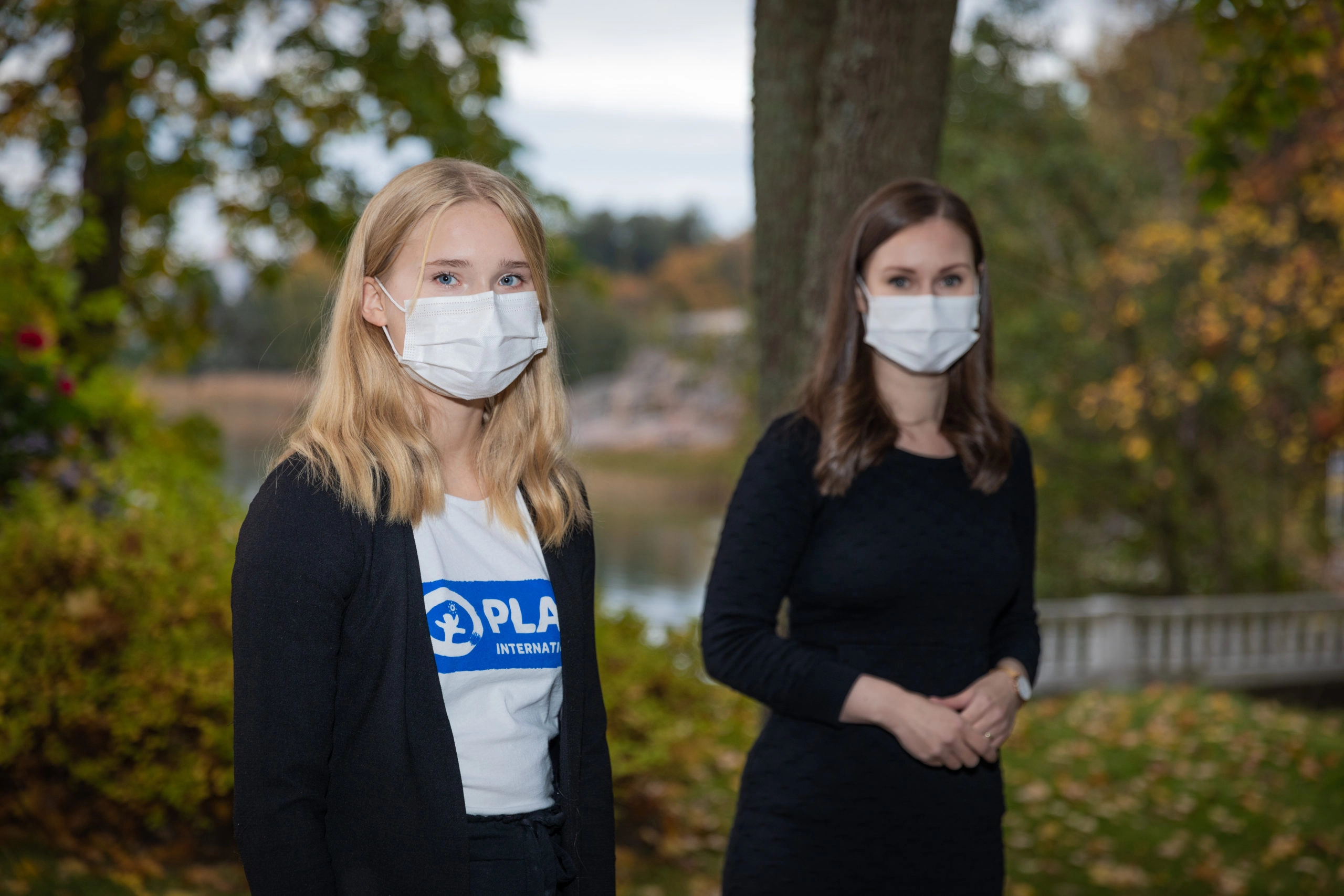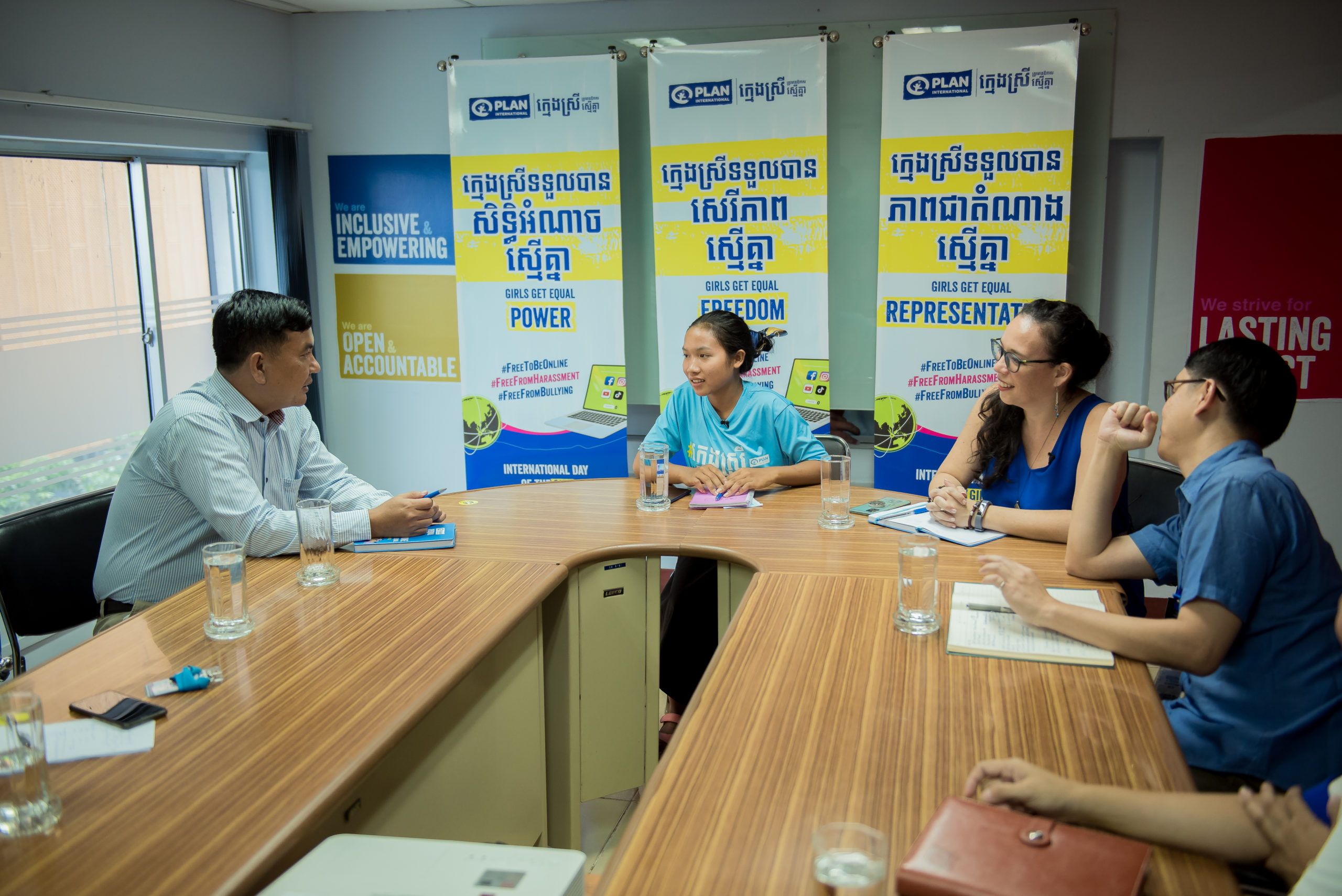This International Day of the Girl, we joined girls around the globe as they called on social media companies to improve their ways of reporting abuse and harassment, so that girls can feel safe and supported online.
Every year on October 11th, we shine a light on the unique challenges that girls face globally and celebrate their enormous potential to bring about change.
As the charity for girls’ equality, Plan International played a significant role in the United Nations introduction of International Day of the Girl in 2011 – the day was born from our campaign to see girls on the global agenda.
Online abuse is a serious issue. Every day, everywhere, girls are physically threatened, racially abused, sexually harassed, and body shamed online. With COVID-19 driving lockdowns around the globe, girls are spending more time online, increasing the risk of online abuse and harassment.
On October 5th, in the week leading up to International Day of the Girl, we launched Plan International’s groundbreaking Freedom Online research report. In what was the largest ever survey of its type, we spoke to 14,000 girls across 32 countries about their experiences online. We learnt that more than half have been harassed and abused on social media.
The social media platforms designed to connect us as a global community, are drastically failing girls and young women, and inadequate reporting mechanisms are allowing harmful abuse to slip through the cracks.
Online safety is a particular concern in the Pacific, which has seen a rapid expansion of mobile phone technology over the last decade.
Online Safety in the Pacific, a second report by Plan International Australia launched after IDG in collaboration with ChildFund Australia and Western Sydney University, found that the fear of online harm for girls is much higher than for boys in the Pacific, and a common response is for parents to block girls’ access to the internet altogether. These findings suggest a need for effective programs and strategies that can help children and parents to become informed and active global citizens in a digital world, while also being mindful of and skilled to deal with the risks. Rather than limiting girls access to the internet because of their perceived vulnerability, solutions need to focus on making the online space safer for girls.
Girls, in all of their diversities, need to know that when they’re abused and threatened online, they can report it. They need to know that they’ll be listened to, that action will be taken, and that perpetrators will be held accountable.
And so, Youth Activists from around the globe penned an open letter to Instagram, Facebook, TikTok and Twitter for International Day of the Girl, calling for these leading social media platforms to work with girls to create stronger reporting mechanisms for violence that meet girls’ needs and hold perpetrators to account.
We were thrilled to see how well the report was received and the global media attention it attracted. Our report and campaign amplified girls voices across leading TVs stations, radio and publications, with our Youth Activists interviewed by the likes of The Guardian, ABC, SBS, and even making it to the front page of The Age in Australia. On an international level, The Freedom Online report received coverage from Al Jazeera, Forbes, Reuters and BBC.
Throughout the week we received strong support from our ambassadors, partners and sector friends with Benjamin Law, Yasmin Poole and Jan Fran, The Body Shop, CARE, IWDA, Respect Victoria, and the Office of the E-Safety Commissioner all sharing our report and campaign across their platforms.
And in addition to our wonderful Youth Activists, we also engaged a number of high profile personalities and influencers to share the campaign with their networks through social media, including Ginger Gorman, Jamila Rizvi, Kaz Cooke, Yassmin Abdel-Magied, Jaguar Jonze, Sam Royce and Mastechef Judge Melissa Leong.
MPs also showed their support, among them Penny Wong, Kristina Keneally, Tanya Plibersek, Larissa Waters and MaryAnne Thomas.
One week after the launch of our research into girls’ experiences of online abuse and harassment, more than 45,000 people have signed the open letter to social media companies, and some of the world’s most popular platforms have responded by agreeing to work with girls around the world to address online harassment!
Facebook, Instagram and Whatsapp have agreed to work with us and have direct conversations with girl activists through a series of listening sessions. This is an opportunity for girls and young women, in all their diversity, to share their experiences, and for Instagram to learn how they can better support girls on their platform.⠀⠀⠀⠀⠀
And Plan International, and the girl activists we work with, have also started conversations with TikTok and Twitter, and have met with eSafety Commissioner Julie Inman Grant and Australia’s Ambassador for Gender Equality, Julie-Ann Guivarra.
These are huge steps towards making social media platforms safe spaces, where girls are free to express themselves without fear. But it’s not the end of the work – it’s crucial that these listening sessions are followed by real commitments to improve reporting mechanisms.
With your support, there is a chance of real, significant changes to make our online spaces safer for everyone. Sign the open letter now, to stand with girls against online harassment and abuse.
International Day of the Girl goes global
From webinars and panel discussions, to girls stepping into the roles of power-holders, October saw International Day of the Girl activities taking place around the globe.
In the Dominican Republic, 10 year old Melany stepped into the shoes of the President, and in Finland 16 year old Aava took on the role of Prime Minister Sanna Marin.

In Cambodia, 17-year-old Mao took over the role of Plan International Country Director, taking part in a (WASH) sector knowledge event, program coordinator meeting and met with Plan International staff members.

And in Kenya, 18-year-old Mary took over the role of Kenyan Cabinet Secretary in the Ministry of Information and Communications, and attended a press briefing where she spoke to various media organisations about our open letter to social media platforms to end online harassment.
She called on the government to tackle online harassment to ensure that girls and young women in Kenya are #FreeToBeOnline, and the Ministry committed to working on it.
